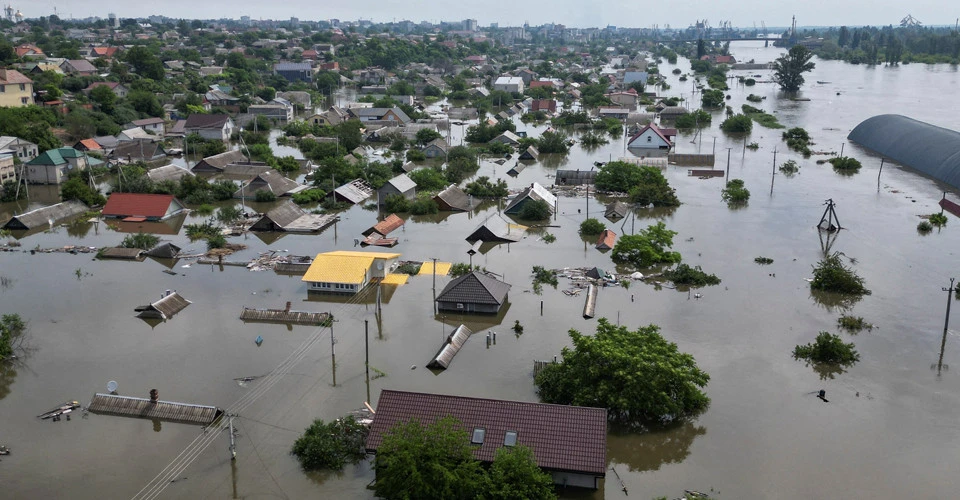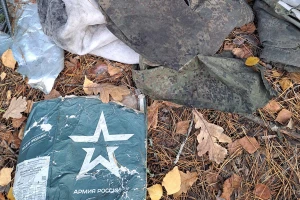
Ways to prosecute Russia for Kakhovka dam breach and Ukraine’s flooding
The catastrophic flood in Ukraine necessitates collecting evidence and exploring legal avenues for prosecution
Anthony Burke, a professor specializing in environmental politics and international relations at the University of New South Wales in Australia and a principal at the Planet Politics Institute, shared his opinions on the ways to hold Russia liable for the catastrophic damage it caused in Ukraine in a piece for the Washington Post.
The consequences of the Kakhovka dam destruction
The disastrous flooding caused by the deliberate destruction of the Kakhovka HPP dam by Russian troops has unleashed unparalleled environmental devastation.
The consequences encompass a wide range of areas, including submerged wetlands, forests, and national parks. Moreover, the deliberate destruction has led to the release of hazardous substances such as land mines, heavy metals, phosphorus, and sewage, further compounding the ecological crisis. The toll on wildlife and livestock has been catastrophic, and the loss of vital crops, including grains, seeds, fruits, and vegetables, has dealt a severe blow to agricultural productivity.
Multiple sectors, spanning from farming, fishing, and forestry to metals, chemicals, energy, and tourism, are grappling with the aftermath of this disaster. However, the full extent of the consequences will only become apparent over the course of several years.
What can Russia be held liable for?
If there is sufficient evidence to prove that Russia was responsible for the destruction of the Kakhovka dam in Ukraine, the country could potentially face legal repercussions. Such actions would fall under the jurisdiction of both the Ukrainian criminal code, which explicitly prohibits ecocide, and the environmental war crimes provisions outlined in the Rome Statute of the International Criminal Court (ICC), according to Burke.
In Ukraine, ecocide is defined as “mass destruction of flora and fauna, poisoning of air or water resources, and also any other actions that may cause an environmental disaster.”
As the extent of the damage continues to escalate with each passing week, Anthony Burke outlined potential charges related to the devastation of the expansive reservoir, including:
-
Cubic meters of water discharged: 18 billion
-
Hectares flooded: 340,000
-
Settlements submerged: 43
-
People homeless: 400,000
-
People without clean water: 700,000
-
Deaths: 52
-
Hectares of farmland damaged: 600,000
-
Animal and plant species threatened: 103
-
Metric tons of oil released: 280
-
Kilometers of irrigation canals deprived of water: 12,000
Although investigating and prosecuting these crimes will pose significant challenges, there is a genuine possibility of success. Ukraine is documenting numerous instances of severe environmental damage resulting from the Russian invasion, accumulating substantial evidence to strengthen the charge sheet.
However, at present, ecocide has not been established as an international crime. A group of legal experts has formulated a new draft article to be considered for inclusion in the Rome Statute in 2021. Subsequently, the European Parliament has utilized this definition to propose that the European Union incorporates ecocide into its updated environmental crimes directive during this year's proceedings.
Sabotage could potentially be subject to prosecution by the International Criminal Court (ICC) as an environmental war crime. Article 8 of the ICC statute considers deliberate attacks that result in widespread, long-term, and severe damage to the natural environment, which is clearly disproportionate to the anticipated military advantage, as criminal offenses.
Furthermore, Additional Protocol 1 to the Geneva Conventions states that “dams, dykes and nuclear electrical generating stations, shall not be made the object of attack, even where these objects are military objectives, if such attack may cause the release of dangerous forces and consequent severe losses among the civilian population.” Its provisions regarding the environment are regarded as customary international law binding on all states.
There are also other ways provided for by the law of occupation. “If negligence caused the collapse, Russia could still be legally exposed under the law of occupation. That obliges forces to respect the human rights of civilians (especially the right to life), preserve public order and safety, and respect property. In that case, the dam disaster would just be the latest of Russia’s many failures to meet its obligations in Ukraine’s occupied regions. If the flooding causes a large loss of life, the event might add to the pattern of crimes against humanity during the war,” explains Anthony Burke.
What else should be done?
Members of the United Nations Security Council should draft a resolution in response to the event, condemning it and reminding Russia of its legal obligations. The resolution should also call upon the International Criminal Court (ICC) to initiate a comprehensive investigation into environmental war crimes in Ukraine, utilizing the framework of its existing investigation. Although Russia is likely to veto such a resolution, documenting its diplomatic obstructionism will be important for the record. If Ukraine requests assistance, countries can provide support by sending lawyers, ecologists, and funding to aid in the investigation, without directly involving NATO.
Alternatively, both the UN Security Council and General Assembly possess the authority to establish a special tribunal dedicated to investigating and prosecuting these crimes, as Ukraine has already advocated for in order to address the international crime of aggression.
“Wider reforms must also be fast-tracked. To ease prosecution and remove loopholes that allowed the armed attacks on the Zaporizhzhia nuclear power plant, the Rome Statute and the Additional Protocol should be redrafted. The test that damage must be “widespread, long-term and severe” should be changed to “severe and either widespread or long-term” in Additional Protocol I. The reference to military advantage should be deleted from the Rome Statute.” Burke also suggests reconsidering and eliminating the veto power currently held by the permanent five Security Council members, namely Russia, the US, France, the UK, and China.
Why it should be done
Despite Russia's evident disregard for international law, it remains imperative to pursue prosecutions for ecocide and environmental war crimes. Skeptics may question the value of such efforts, but they serve a fundamental purpose: to ensure justice for the victims and to deter and delegitimize future violations. Just as the Nuremberg trials were conducted to hold Nazi officials accountable, these prosecutions aim to achieve the same goals.
While sanctions can be perceived as a politically biased tool, international humanitarian law establishes a universal standard that must be upheld. Failure to enforce the law can lead to a loss of legitimacy and undermine its effectiveness.
The situation at the Zaporizhzhia nuclear plant is particularly worrisome. The breach of the dam has resulted in the loss of a crucial water source for its cooling ponds. The plant has experienced frequent power disruptions in recent months, and Russian forces still maintain a presence in the area. Given the constant risk of a potential nuclear disaster, it is crucial for the international community to demonstrate unwavering resolve in preventing and punishing environmental crimes committed during times of war.
-
On June 6, invading Russian troops blew up the Kakhovka hydroelectric power plant, completely destroying it. As a result of the tragedy, settlements in the Kherson region and Mykolaiv regions were flooded. For a detailed coverage of the events, click here. For more news on the situation related to the hydroelectric power plant explosion, please click here.
- News














































